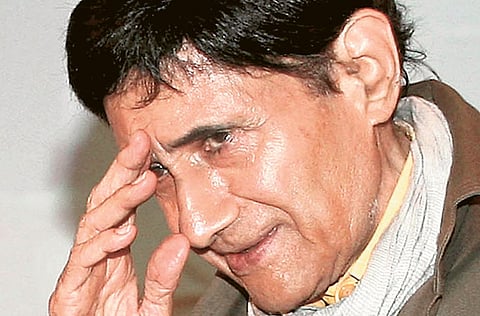Dev Anand: Forever young
Often compared to Gregory Peck, Dev Anand was best known for his boundless energy and passion for film

From Baazi in 1951 to Chargesheet in 2011, it was an untrammelled joy ride through six decades of Bollywood. Dev Anand, died aged 88, oversaw the growth of the Hindi film industry from the black and white era to Technicolour and beyond, leaves behind a unique legacy of a star who had moved way beyond his cinematic works.
He acted, he directed and produced... almost until the end, with his last film Chargesheet being released this year. Reviewing Chargesheet, a well known critic put against the rating "irrelevant". It truly didn't matter by then whether the film was good or bad. The much loved legend had given so much through the years that he was forgiven almost everything.
Anand lived and died on "his own terms," his nephew and renowned film director Shekhar Kapur said in a posting on Twitter. "He was working one minute. Sat down and smiled. And was gone the next. So much to learn."
Anand died of a heart attack on Saturday night in a hotel in London, where he had gone recently for a medical checkup, the family said.
Anand epitomised the suave, urban gentleman who romanced his way through generations of heroines —from Nalini Jaywant to Zeenat Aman.
He ruled the black and white era with movies like Munimji, CID and Hum Dono and then moved into the colour age with classics like Jewel Thief and Johny Mera Naam. He provided the launch pad for some of Bollywood's most remembered head-turners such as Aman and Tina Munim.
He acted as the lead in more than 110 movies. Chargesheet, in which he also directed, was released this year. The prolific star released an autobiography Romancing with Life in September 2007.
Early life
Born on September 26, 1923 as Dharam Dev Pishorimal Anand in Gurdaspur district of then undivided Punjab to a lawyer father, he graduated in English literature from the Government College, Lahore (now in Pakistan) before moving to Mumbai, where his elder brother, the late filmmaker Chetan Anand, was finding his foothold in Bollywood.
Like others, Anand too had his share of struggles before embarking on his celluloid journey. He worked as a military censor officer at Churchgate on a salary of Rs160 (Dh11) and joined as a member of the Indian People's Theatre Association (IPTA).
Destiny, however, had something else in store for him and soon he was offered a role in Hum Ek Hain (1946).
Two years later, the turning point in his career came when he was offered his first big break by Ashok Kumar in Bombay Talkies' hit Ziddi.
A genius in his own right, Anand turned producer and launched his production house Navketan in 1949. As a prior commitment, he asked Guru Dutt to direct the banner's first outing — crime thriller Baazi (1951), which made him a star.
Inspired by Hollywood actor Gregory Peck, Anand's rapid style of dialogue delivery, his array of hats, jackets and mufflers, and a penchant for nodding while speaking became his trademarks.
His first colour film, Guide, which was directed by his brother Vijay Anand, with Waheeda Rehman in 1965, became a cult movie and is remembered as one of his best works.
His maiden attempt at direction, Prem Pujari, flopped. But Anand got lucky with his 1971 Hare Rama Hare Krishna, which launched actress Aman. Later he introduced Jackie Shroff, Tabu and Richa Sharma to filmdom.
After the 1978 hit Des Pardes, which introduced Munim, his films failed to create a mark. But he was never one to lose heart.
On his birthday in September, the upbeat actor told the Press Trust of India that he still had more to offer.
"My life is the same, and I am at a beautiful stage at 88," he reportedly said in the interview. "I am as excited as I was in my 20s. I have so many things to do," including a sequel to his 1971 film that he had titled Hare Rama Hare Krishna Aaj.
Anand was given several prizes during his career, including lifetime achievement awards by Filmfare in 1993 and Screen Videocon in 1996.
Also known for social work, Anand dabbled in politics in the 1970s, launching a short-lived political party and leading other film stars in opposing then-Prime Minister Indira Gandhi's "Emergency" regime, which gave her the power to rule by decree.
Sign up for the Daily Briefing
Get the latest news and updates straight to your inbox



